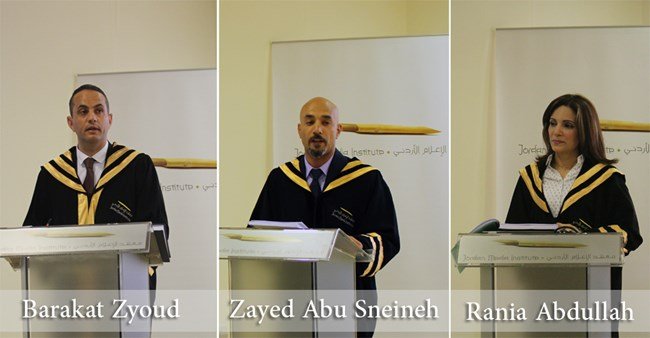Image:

18 Jul 2016
Jordan Media Institute (JMI) students submitted their theses to a jury after completing their research. The three students were the first after JMI introduced the Thesis Track in 2014 in addition to the exiting Comprehensive Exam Track for the Master’s in Journalism and New Media Program.<br />
<br />
"Commitment of the Jordanian Press to Legal and Ethical Responsibility in Publishing News of Armed Groups from the Viewpoint of Opinion Leaders in Jordan" was the title of the thesis by Barakat Zyoud.<br />
<br />
He chose the subject of his research following Jordan’s confrontation with armed groups, leading up to Daesh (ISIS) targeting Jordan and news of the Kingdom joining the international coalition, amid lack of official sources to confirm or deny those reports. Zyoud targeted opinion leaders in Jordan and Al Rai, Al Dustour, Al Ghad, and Al Sabeel newspapers. The study concluded that Jordan's press had been moderately committed to legal and ethical responsibility and had refrained from publishing anything that would sow discord among citizens and that would undermine Jordan's national security.<br />
<br />
The jury included JMI Dean Dr. Basim Tweissi, Dr. Manal Mazahreh, Dr. Sakher Khasawneh and Dr. Jean Karam.<br />
<br />
Zyoud, who later received his MA in Journalism and New Media from JMI, has a BA degree in Arabic Language from the Hashemite University. He is currently an editor and correspondent at the Jordan News Agency (Petra).<br />
<br />
JMI student Rania Abdullah analyzed Daesh's media campaigns. Her thesis, the first in Jordan, was entitled, Content Analysis of Media-Propaganda Campaigns of Islamic State “Daesh”: Twitter as Example. Abdullah chose the title after observing that Daesh’s extensive propaganda cyber warfare was almost equal to, or even exceeded its war on the ground.<br />
<br />
The study aimed at learning about the content of the propaganda campaigns of Daesh, the platforms they used, the themes and terms of reference as well as the characteristics of the target audience, besides the visible objectives of the propagandistic discourse of the organization. Abdullah analyzed a sample of all the media campaigns launched on the twitter accounts of Al-Furqan Media Foundation and Al-Hayat Media Center during the period between 1 June 2014 and 31 October 2015. They numbered 37 campaigns. She also studied Arabic translation of three editions of Al Hayat’s Dabiq Magazine.<br />
<br />
The study noted that Daesh has its own media and propaganda strategy. The key feature of that strategy is that it primarily has political, and then religious, terms of reference, and that the same objective was shared among all its diverse and multiple media organizations.<br />
The study also concluded that Daesh tailors its campaigns to the different target audiences and their identity. Its campaigns addressed four levels of audiences with the majority being the global public followed by the residents of areas under its control. Some messages targeted Arab and Islamic states, while others addressed members of the international coalition, specifically Western states.<br />
<br />
Abdullah, who later received her MA in Journalism and New Media from JMI, also has a BA in Media from the University of Petra. She has participated in a number of human rights studies and written working papers on university violence, education and academic freedoms. She worked as assistant media adviser at the Middle East Development Network and is currently assistant researcher at JMI.<br />
<br />
The jury included JMI Dean Dr. Basim Tweissi, Dr. Mohammad Abu Rumman, Dr. Jamal Shalabi and Dr. Sakher Khasawneh.<br />
<br />
On a different note, Zayed Abu Sneinah chose to research the "Role of Arab Sport Channels in Promoting Sport Education among Jordanian University Youth: beIN Sports as Example".<br />
<br />
The study targeted students of faculties of sport at the four Jordanian public universities: University of Jordan, Hashemite University, Yarmouk University, and Mutah University.<br />
<br />
The study concluded that beIN Sports was the most watched channel by the target group. Jordan's Sport Channel ranked second. This underlines the importance of local sport news to Jordanian youth. Dubai Sports Channel and Abu Dhabi Sports Channel ranked third and fourth respectively.<br />
Abu Sneinah, who later received his MA in Journalism and New Media from JMI, holds a BA in Physical Education from the University of Jordan. He is a sports writer and analyst, and has also worked in the sport field as teacher, trainer and rehabilitator in Palestine, Saudi Arabia, the UAE and Jordan.<br />
<br />
The jury included JMI Dean Dr. Basim Tweissi, Dr. Suha Adeeb, Dr. Jean Karam and Dr. Sakher Khasawneh.



